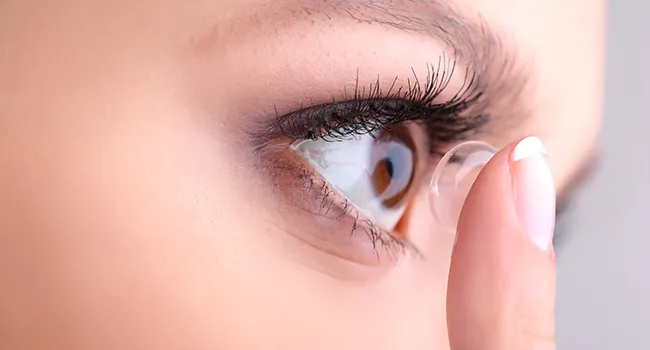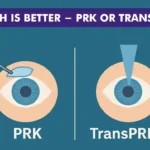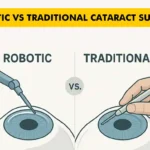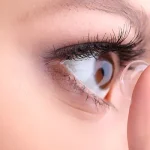Refractive error is one of the most common problems not only in India (but across the world). As per a report, under-corrected refractive error is one of the common causes of reversible blindness in India. Refractive error hampers your vision, and the objects closer and/or far distant start getting blur.
Such errors are normally treated using corrective lenses such as spectacles and contact lenses. Many people who are not comfortable wearing spectacles opt for contact lenses to correct the refractive errors, including nearsightedness, farsightedness, presbyopia, and astigmatism.
Unlike glasses, contact lenses do not fog up, nor they get drenched in water. However, when it comes to choosing contact lenses for eyesight, you should always consult an experienced eye doctor. Get the contact lenses from a good renowned brand only since it would offer you better vision and a comfortable feeling when wearing them. In no scenario you should experience itchiness in the eyes when you are wearing the lenses.
Here are some basics of contact lenses that will come in handy when choosing the contact lenses for your eyes.
Materials used in making contact lenses
Lens material is one of the first things that should be looked into when selecting the contact lenses for eyes. There are five different categories of contact lenses based on the making material:
Soft Contact Lenses
As the name indicates, soft contact lenses are made up of soft, flexible plastic material called silicone-hydrogels. These lenses are super thin, due to which you feel a lot more comfortable when wearing them. Silicone-hydrogels provide more oxygen to the eyes.
Disposable Contact Lenses
In case you are on the lookout for use & throw type of contact lenses, then disposable contact lenses might be the right choice for you. A daily wear disposable schedule has to be followed where you need to wear a new pair of lenses each day.
You might have the question – What happens to the pairs of contacts I wore the previous day? Since these are disposable lenses, you are supposed to dispose of them off since these lenses, once worn, cannot be used again.
Gas Permeable (GP) Lenses
These contact lenses are also referred to as RGP or GP lenses. When worn, the lenses maintain their shape on the eyes, thereby helping in the correction of astigmatism and other refractive errors.
The specialty of gas permeable lenses is that they are relatively smaller in diameter when compared to soft contact lenses. You might have to go through a fair bit of learning and adjustment cycle with these lenses.
GP lenses provide an improved flow of oxygen to the front part of the eye. The major advantage of choosing GP lenses is that it reduces the risk of contracting any eye problems caused due to reduced flow of oxygen.
Conventional Hard Lenses (PMMA)
These are hard contact lenses that are primarily made of stiff plastic called PMMA (polymethyl methacrylate). Unlike soft or GP contact lenses, hard lenses do not mould to the shape of the eyes. Conventional hard lenses can handle wear & tear and also offer high durability. The major downside is that hard lenses are the least comfortable for the eyes.
It is recommended to consult an eye doctor before opting for the contact lenses that suit your requirements.
How long should you wear contact lenses?
This is the first question that pops into the minds of first-time buyers of contact lenses. Before we answer this question, it is essential to reiterate that contact lenses are worn inside the eyes. In no case should you have a discomfort feeling when wearing the lenses.
The answer to the question is ‘Wearing time of the contact lenses largely depends on its type (or category)’. Based on the wearing time, here are the broad categories of contact lenses:
- Daily wear contact lenses
cannot be worn overnight since your eyes might experience a lack of oxygen when these contacts are worn when sleeping.
- Extended wear contact lenses
can be worn overnight at least for a few days (precisely a week).
[Read – What Really Happens When You Sleep In Your Contact Lenses?]
Ask pertinent questions regarding the best contact lenses brand, contact lenses price, and durability of the lenses to the eye doctor in order to shortlist the best contact lenses for eyesight.
How to take care of the contact lenses?
Irrespective of the type or brand of the lenses, some basic principles have to be followed when handling contact lenses.
- Use a fresh lens solution to clean the lenses.If you are using disposable contact lenses, dispose of them as prescribed by the eye specialist.
- Occasionally clean the case used for storing the contact lenses.
- It is advisable not to sleep wearing the contact lenses (even when using extended wear contact lenses), as it might cause irritation in the eyes.
- Always refill the case housing the lenses with a fresh solution instead of mixing with an existing solution.
Buying Contact Lenses
The first step in buying the best contact lenses for eyes is consulting an experienced eye specialist. Our team at Centre for Sight will help you with a comprehensive eye assessment and help you choose the best contact lenses for your eyes.
Article: The All-In-One Guide of Contact Lenses
Author: CFS Editorial Team | Mar 06, 2021 | UPDATED 12:11 IST
*The views expressed here are solely those of the author in his private capacity and do not in any way represent the views of Centre for Sight.





